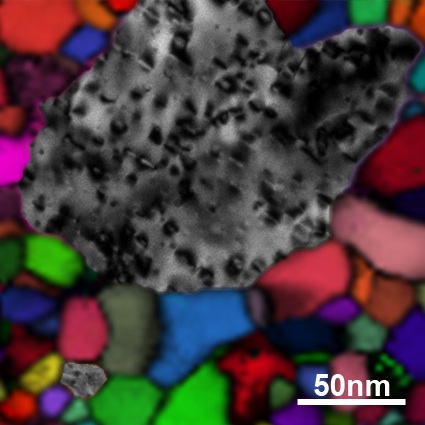 Dr. Mitra Taheri
Dr. Mitra TaheriHoeganaes Assistant Professor Mitra Taheri is one of 68 researchers out of 850 proposals submitted to receive a 2012 Early Career Research Program grant from the Office of Basic Energy Sciences of the Department of Energy (DOE). The DOE Early Career Research Program funds scientists and engineers early in their careers to conduct innovative research in one of several key areas of interest to DOE. Taheri is the first to receive such a grant at Drexel University.
With "Linking the Correlated Dependence of Grain Boundary Structure and Density to Defect Evolution Mechanisms during Radiation Damage," Taheri will use the five-year $820K grant to study nanocrystalline materials and their ability to withstand high doses of radiation for possible use in nuclear reactors. Revealing that these materials are radiation tolerant would represent a milestone for various industries, including nuclear energy and solar applications.
 Transmission electron microscopy provides a powerful tool to understand the potential of nanocrystalline metal alloys as radiation tolerant materials. In this figure, black and white TEM images of radiation damage in grains of nanocrystalline iron are overlaid on a color-coded map of grain orientation acquired by TEM. Radiation damage in nanocrystalline iron, indicated by black spots, decreases as a function of decreasing grain size. This image was created from work performed in Taheri's Dynamic Characterization Group, specifically by Ph.D. student Gregory Vetterick.
Transmission electron microscopy provides a powerful tool to understand the potential of nanocrystalline metal alloys as radiation tolerant materials. In this figure, black and white TEM images of radiation damage in grains of nanocrystalline iron are overlaid on a color-coded map of grain orientation acquired by TEM. Radiation damage in nanocrystalline iron, indicated by black spots, decreases as a function of decreasing grain size. This image was created from work performed in Taheri's Dynamic Characterization Group, specifically by Ph.D. student Gregory Vetterick."Having a predictive understanding of how nanocrystalline materials behave when undergoing irradiation would help to lay a foundation for use of these materials in next generation nuclear reactors, as well as other extreme environments," says Taheri.
In addition to a DOE Early Career Research Program grant, Taheri received a National Science Foundation Faculty Early Career Development grant (NSF-CAREER) earlier this year.
News of Taheri's receipt of the grant was announced in a press release from Congressman Chaka Fattah.